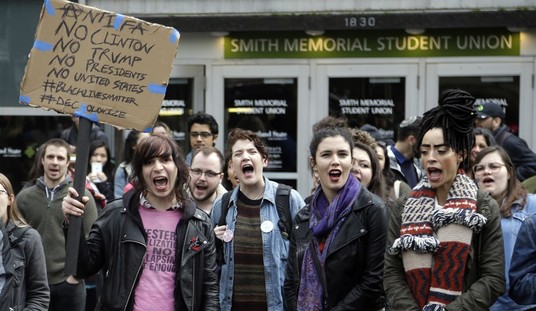Have Americans finally gotten fed up with racial determinism, ‘gender identity,’ and cultural self-flagellation? Or maybe we have decided to put a halt to being made to look like fools?
While the media continues to obsess over skin color and the hierarchy of victimology, the rest of us have largely checked out of the Great Awokening, writes conservative columnist and author Kristin Tate. We can thank a series of corporate missteps and grift exposures, Tate argues, but the end would have come inevitably — even without the most obvious catalyst:
Perhaps we have TikTok personality Dylan Mulvaney to thank. Bud Light seems to have stepped on the proverbial consumer third rail in its partnership with the transgender activist that led to boycotts and has hurt sales. The marketing deal may make no sense in hindsight, but Madison Avenue consultants must have thought it was the smart thing to do at the time. After all, Bud Light was — was — the best-selling beer brand in the country. Anheuser-Busch InBev, they theorized, could see its ESG score bump up and gain some LGBTQ plaudits on social media, while not losing its core demographic of straight men who might not like the campaign but would continue buying its beer anyway.
The decision was among the worst marketing decisions in modern history and awakened conservatives to the fact that they hold substantial market power. Bud Light’s sales have declined about 30% since the start of April and show little sign of recovery. For the Great Awokening, it was a beer (or a fridge) too far.
It’s not merely Bud Light sales that are collapsing, Tate points out. The entire Woke market has collapsed in corporate America too. Three years ago, American boardrooms obsessed over diversity, equity and inclusion (DEI) plans, creating a boom in woke-scoldery as a profession. Now, however, the boom has turned bust:
In 2020, large corporations climbed over each other to announce seven- and eight-figure grants and endowments for racial justice causes. Between July 2020 and July 2021, the number of DEI positions nationwide nearly doubled. Now, that funding has slowed to a trickle. One-third of DEI professionals lost their jobs in 2022. A more recent survey found a decline in DEI job postings of more than 38% since last summer. NPR noted that similar programs may see a decline because of the Supreme Court decision earlier this year to end affirmative action in college admissions.
Although Tate doesn’t mention it, the boom in corporate ESG scoring (for “environmental, social, and governance” policies) also appears to have sharply declined of late. Part of this has come from a realization that ESG scoring isn’t just reliant on virtue signaling, but on demands for wealth and productivity redistribution. Business owners and shareholders have begun to balk now that the grift has become obvious:
ESG has undeniably become a tool to advance “net zero” and “low-carbon economy” goals. It has become a means for groups with certain social agendas to reward or punish firms for how well they comply with their agenda, regardless of the bottom line. And these groups have also developed enforcement mechanisms for their progressive agendas. They criticize companies that “pretend” to comply with ESG goals, saying they are “greenwashing,” as if this were somehow similar to money laundering.
They have also created the pernicious idea of a (social) “license to operate,” suggesting that companies need approval from the “community” to do business. But a business should not be subjected to a popularity contest among amorphous stakeholder special interest groups. Rather, it must be subject to the market and its customers.
The bait-and-switch tactics employed make ESG downright pernicious. Business owners, customers, and investors are upset because they rightly see that ESG has become less about risk mitigation and instead is being used to divert resources to environmental, climate, and social goals that have nothing to do with shareholder or investor returns.
Investors are starting to slowly retreat from ESG strategies, as NASDAQ itself warned that the ROI on those leave something to be desired. Such as, y’know, the fundamentals of investment:
Environmental, social, and governance (ESG) investing has become a fiercely debated trend within the financial sector. While some view ESG factors as crucial considerations, others argue these criteria are politically motivated and detract from returns. Financial advisors say that personal values, such as ESG, can guide a viable investment strategy. However, they add, investors focused on maximizing returns may also want to consider other factors, such as higher expense ratios charged on many ESG funds, and not restrict themselves only to investment sectors that score relatively well on ESG.
That’s a polite way of saying that ESG is a losing strategy for your money, at least as a primary consideration. And given that corporations now have to shovel large amounts of capital into ESG initiatives in order to satisfy the activists, it’s almost definitionally contrary to normal and rational investment strategies.
More to the point, though, Americans have lost their taste for activism in commerce. A Gallup poll this week demonstrated that erosion, and it comes from a surprising demographic:
Less than half of U.S. adults (41%) believe businesses should take a public stance on current events, down from 48% in 2022. …
Most Democrats (62%) believe businesses should take a public stance on current events, compared with just 17% of Republicans and 36% of independents. While still high, the percentage of Democrats who believe businesses should take a stance has declined from 75% in 2022. The percentage of independents reporting companies should take a stance has declined slightly, by four percentage points, while Republicans’ views on this issue have remained essentially unchanged.
Democrat support for corporate activism dropped thirteen points in a single year. Does anyone wonder why? The Bud Light fiasco mentioned by Tate probably had a large impact on that, as she argues, but so did an equally catastrophic campaign by Target with their partnership with a Satanic designer to stock transgender swimwear in the mass market. The boycott wars were all fun and games for Democrats and progressives until conservatives proved they could play the same game, and sometimes better than the progressives.
And we haven’t even gotten to the cultural attacks by Disney, the grift of Black Lives Matter fundraisers, and the disappearance of tens of millions of dollars into Ibram X. Kendi’s center at Boston University. All of these have added up to the impression that The Great Awokening is just a marketing scheme, and critics are getting bolder in pointing it out.
Declaring it on the verge of collapse might still be too optimistic at this point. However, it’s clearly on the run, and the end will come soon enough. Let’s hope it comes before more of America’s large cities enter doom loops by falling under its spell.







